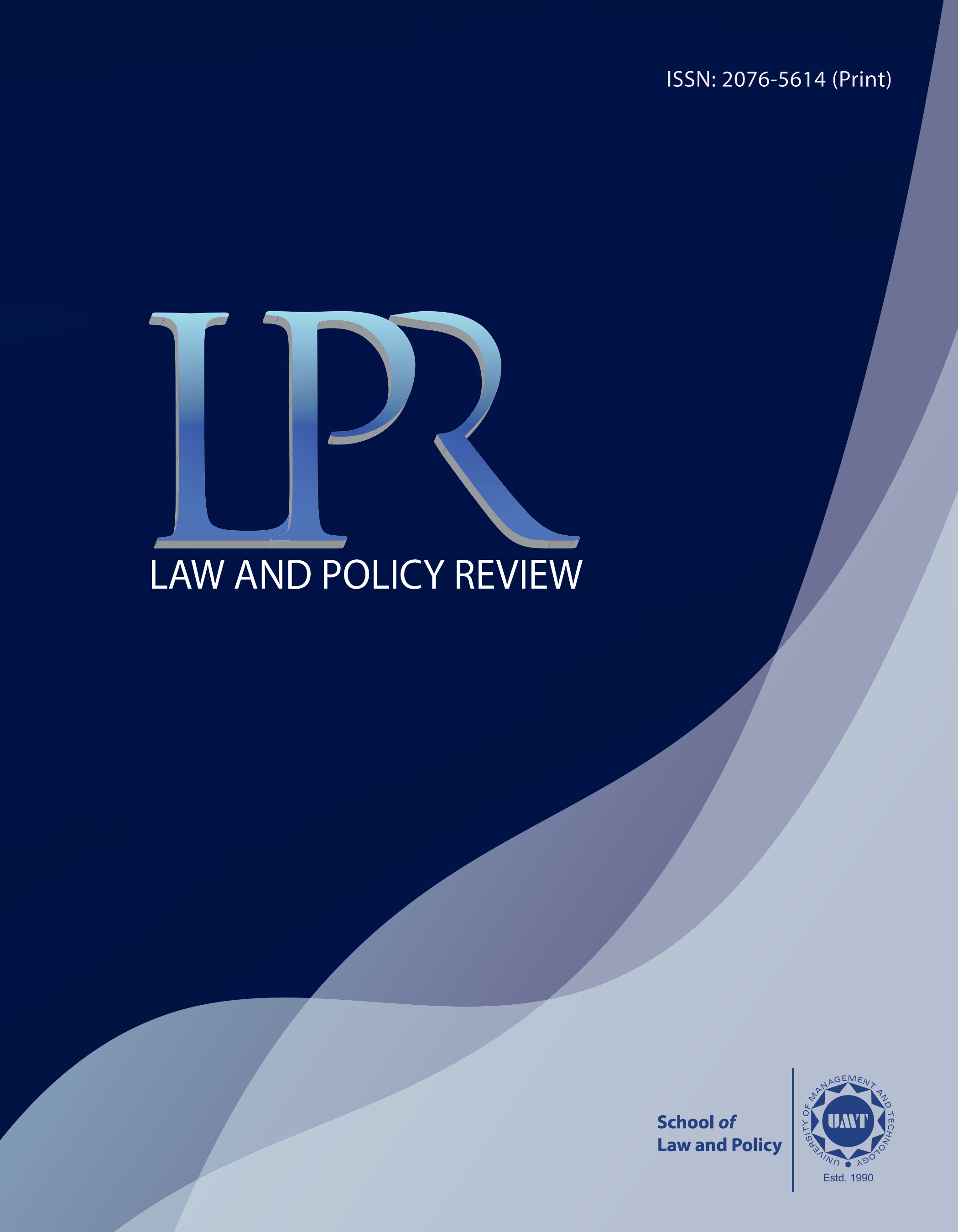Expert Opinion under the Pakistani Legal System: An Analytical Study of its Evidential Value
Abstract
 Abstract Views: 80
Abstract Views: 80
The current paper analyzes the scope and evidential value of expert opinion/evidence under the Pakistani legal system. The analysis is based on the case law decided by the superior judiciary with reference to some categories of expert evidence including medical evidence, handwriting expert’s opinion, ossification test, and the opinion of ballistic and explosive experts. The concept of the admissibility of expert opinion was legislatively introduced in the Indian subcontinent by the British colonial government. This legal framework was inherited by both India and Pakistan at the eve of partition in 1947. In addition to this default legal system, some new legal provisions were enacted in the Qanun-e-Shahadat Order 1984 and the Anti-Terrorism Act 1997 to augment the value of those proofs that are based on technology and modern devices. Over the years, scientific and technological advancements in some categories of expert evidence have brought substantial precision and accuracy that is likely to have encouraging consequences for the value of such expert opinions. In short, evidential value of any opinion evidence hinges upon the nature of the evidence, as well as the scientific sophistication and technological precision of the concerned expert in that field, with reference to the particular circumstances of each case.
Downloads
References
Abdul Rasheed v. Syed Fazal Ali Shah. ___ (2016 SCMR 2163).
Abdur Rehman v. State. ___ (1998 SCMR 1778).
Ali Sher v. State. ___ (2008 SCMR 707).
Ali, S. A., & Woodroffe, J. G. (1898). The Law of evidence applicable to British India. Spink & Company
Aman Ullah v. State. ___ (2013 PCrLJ 1440 [Lahore]).
Beecher-Monas, E. (2007). Evaluating scientific evidence: An interdisciplinary framework for intellectual due process. Cambridge University Press
Board of Intermediate & Secondary Education (BISE) Lahore v. Akbar Ali. ___ (2017 YLR 1485 [Lahore]).
Cheema, S. A. (2016). DNA evidence in Pakistani courts: An analysis. LUMS LJ, 3(1), 1–15.
Dildar Hussain v. Muhammad Afzaal alias Chala. ___ (PLD 2004 SC 663).
Ghulam Abbas v. State. ___ (2014 PCrLJ 858 [Peshawar]).
Glover, R., & Murphy, P. (2013). Murphy on evidence. (13th ed.). Oxford University Press.
Haleem v. State. ___ (2017 SCMR 709). https://www.capitaldefencemanualpk.com/case/haleem-v-state-2017-scmr-709/
Keane, A., & Mckeown, P. (2022). The modern law of evidence. Oxford University Press
Kennedy, C. H. (1990). Islamization and legal reform in Pakistan, 1979-1989. Pacific affairs, 63(1), 62–77. https://doi.org/10.2307/2759814
Khizar Hayat v. State. ___ (2012 SCMR 429). https://caselaw.shc.gov.pk/caselaw/view-file/NzU5MThjZm1zLWRjODM=
Malu v. Ali Bakhsh. ___ (2013 SCMR 771).
Mst. Saadat Sultan v. Muhammad Zahur Khan. ___ (2006 SCMR 193).
Mst. Shazia Parveen v. State. ___ (SCMR 1197, 2014).
Muhammad Akram v. Muhammad Haleem. ___ (2004 SCMR 218).
Muhammad Aslam v. State. ___ (2012 SCMR 593).
Muhammad Basit v. State. ___ (2016 PCrLJ 1745 [Lahore]).
Muhammad Faizan Riffat Ullah Khan v. State. ___ (2016 PCrLJ 638 [Islamabad]).
Muhammad Ijaz v. Muhammad Amir. ___ (2008 SCMR 819).
Muhammad Ilyas v. State. ___ (2017 YLRN 71 [Lahore]). https://www.supremecourt.gov.pk/downloads_judgements/c.a._1113_2017.pdf
Muhammad Ishaque Qureshi v. Sajid Ali Khan. ___ (2016 SCMR 192).
Muhammad Saleem v. Shabbir Ahmad. ___ (2016 SCMR 1605).
Mushtaq v. State. ___ (PLD 2008 SC 01).
Muslim Commercial Bank Ltd (MCB) v. Amir Hussain. ___ (1996 SCMR 464).
Powell, E., Cutler, J & Griffin, E. F. (1868). Principles & practice of the law of evidence (3rd ed.). Butterworths.
Qadir Yar alias Soni v. ASJ. ___ (2011 PCrLJ 920 [Lahore]).
Ranchhoddas, R., & Thakore, D.K. (1949). The law of evidence. (11th ed.). The Bombay Law Reporter Office.
Sarathi, V. P. (1972). Historical background of the Indian Evidence Act, 1872. Journal of the Indian Law Institute, (Special Issue), 1-25. https://www.jstor.org/stable/43950171
Sarkar, S. C., (2016). Law of evidence (Malaysian Edition). LexisNexis.
Sikandar v. State. ___ (2006 SCMR 1786). https://www.supremecourt.gov.pk/downloads_judgements/j.p._147_2016.pdf
Sqn. Ldr. (R) Umeed Ali Khan v. Dr. (Mrs.) Sultana Ibrahim. ___ (2007 SCMR 1602).
Stephen, J. F. (1872). The Indian Evidence Act (I. of 1872): With an introduction on the principles of judicial evidence. Macmillan and Company.
Syed Sharif Ul Hassan v. Hafiz Muhammad Amin. ___ (2012 SCMR 1258).
The Anti-Terrorism (Amendment) Act 2014 (Act No. VI of 2014). http://www.na.gov.pk/uploads/documents/1403676271_414.pdf
Usman alias Kaloo v. State. ___ (2017 SCMR 622).
Yasir Ali v. State. ___ (PLD 2017 Lahore 737).
Zahoor Ahmad v. State. ___ (2017 SCMR 1662).
Zeeshan @ Shani v. State. ___ (PLD 2017 SC 165).
Copyright (c) 2022 Shahbaz Ahmad Cheema, Samee Ozair Khan

This work is licensed under a Creative Commons Attribution 4.0 International License.
LPR follow an open-access publishing policy and full text of all published articles is available free, immediately upon publication of an issue. The journal’s contents are published and distributed under the terms of the Creative Commons Attribution 4.0 International (CC-BY 4.0) license. Thus, the work submitted to the journal implies that it is original, unpublished work of the authors (neither published previously nor accepted/under consideration for publication elsewhere). On acceptance of a manuscript for publication, a corresponding author on the behalf of all co-authors of the manuscript will sign and submit a completed the Copyright and Author Consent Form.





